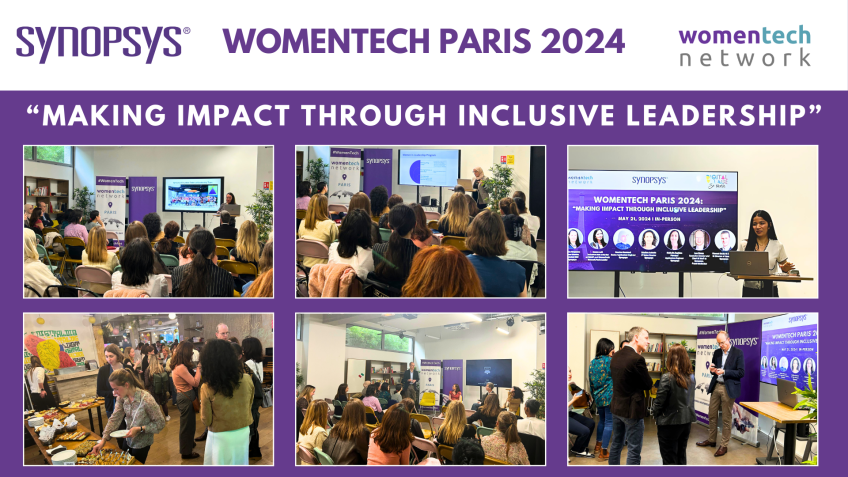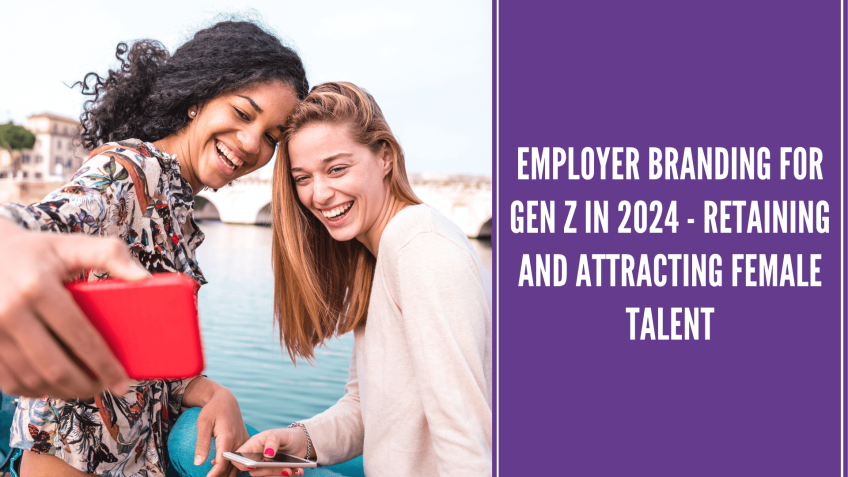Stephanie Geno - From Imposter to Impact: Advancing Tech Inclusion from the Inside
From Imposter to Impact: Advancing Tech Conclusion from the Inside
Hello everyone! I'm Stephanie Gino, the Chief Marketing Officer at Innovid, one of the largest independent advertising technology companies in the market. In this blog, we will talk about inclusion in the tech and advertising sector, highlighting my journey as a black woman navigating through this space. Despite several challenges, I have been successful in my 16-year career and I hope my journey will guide and inspire others facing similar hurdles.
My Professional Journey
My journey has been filled with ups and downs, from graduating with an advertising degree from the University of Florida to fruitless job applications in Chicago. My first corporate job was in human resources, far from the field I desired. However, I managed to transition into the advertising and tech space three years later, which was no small feat. Over the course of this journey, I have discovered my passion lies in eliminating obstacles for underrepresented groups in the tech industry.
Challenges in the Advertising and Tech Space
Despite the rise of female representation in leadership, it is disheartening to find that minority representation in the industry remains low. According to a study of the A NAS' 900 members, only 12% of top marketers are diverse, with just 3% being black.
The industry experiences common barriers such as access to opportunities, compensation bias, and the presumption of unnecessary administrative duties falling on the underrepresented groups. As a community, it is essential to openly discuss these issues, identify our shortcomings, and put into place actionable solutions.
Overcoming Imposter Syndrome
Imposter syndrome, a sense of self-limiting doubt, is unfortunately, disproportionately experienced by women, particularly women of color in the industry. Individuals often feel out of place when they realize they represent a small fraction of the industry leaders. However, it is important to match your confidence with your competence; pride and self-love are crucial tools in overcoming such obstacles.
The Importance of Building Professional Relationships
- One key piece of advice: relationships matter. It's challenging to succeed alone, so having a generally supportive network is crucial in the industry. Furthermore, the statistics have shown that mentored individuals, especially women, are more likely to be successful in their careers than those without mentors. Mentees tend to get promoted five times more often and have better retention rates. Thus, never be afraid to seek support.
- Networking events are invaluable for expanding your career horizons and meeting like-minded individuals. Remember, networking does not have to be formal—it can be as simple as joining a softball team.
Pushing for Increased Representation in Leadership Roles
At Innovid, we affirm our commitment to diversity, equity, and inclusion, establishing mentorship and internship programs and promoting women in tech. As leaders, it's not just beneficial to guide others; it's also rewarding on a personal level. There are several ways leaders can effect change:
- Reflect to make room for growth.
- Empower internal advocates.
- Set realistic goals.
- Focus on progress, not perfection.
Achieving inclusion and diversity in the tech world is about small steps. Besides basic practices such as auditing compensation regularly, encouraging mentoring, offering unbiased training, and ensuring equal access to career opportunities, we should strive to recruit a diverse workforce and cultivate internal growth.
In conclusion, the heightened focus on diversity, equity, and inclusion is spawning change in the tech industry. The increasing number of tech companies crafting diversity plans gives hope for an inclusive future. The technology industry’s dedication to innovation and improvement will, hopefully, result in a brighter, more equitable future for us all.
Looking forward to reading your thoughts or responding to your queries regarding this indispensable topic!
Video Transcription
Things off. Good afternoon, the session from imposter to impact advancing tech conclusion from the inside. I'm Stephanie Gino, the Chief Marketing Officer for Innovid. And it's my pleasure to lead today's discussion. I'd love to kick things off with a little bit of background.
Why me, who am I and why am I here now? Talking with all of you about inclusion today. I have the pleasure of serving in an executive capacity at one of the largest independent advertising technology companies in the market. We work with the world's largest brands, serving a third of all video advertising in the United States and nearly 50% of all connected TV ads. We are building innovative new technology solutions working with the biggest invest in the business and I personally have had the opportunity to be in a driving role to bringing this progress to life. I'm extremely proud of my accomplishments, but I also acknowledge that my path and my journey to get here was not without its challenges. The reality is I am a black woman who has spent the last 16 years navigating the advertising and technology space roles I have earned and I use that word purposefully throughout my career span, the media, creative technology and consulting sides of the business. And again, a lot of that journey, a lot of, of the the road that I've taken to get to where I am has been spent navigating for access and opportunity in this space. Uh Just a little bit about that journey, right?
Uh I knew early on that advertising was my passion. I went to the University of Florida for advertising. I received my degree. I was poised to take on the world. And then, sadly, reality setting. And after I relocated to Chicago, which was a prime market for my chosen field, I found it nearly impossible to break in. After countless applications went unanswered, I finally started my corporate career in human resources, not the field that I thought I would be in. Um But luckily three years later, I was finally able to transition into the advertising and tech space. Um And I'd love to share just a little bit more about that journey and what I've learned along the way as well as some tips to pass along throughout the course of this session. You know, I think if we, if we zoom out, the sad thing is is that the reality in the advertising and tech space is that faces like mine are few and far between. That was true 15 years ago when I was starting out. And unfortunately, it's still true today on a positive note, change is happening, right? The good news is that female representation is improving.
Um This is data based on a study from the A NAS, nearly 900 members that showcased that 52% of top positions in 2020 were held by females. It's fantastic, especially when you consider that just two short years ago, men still help this majority. Yeah. While there's been strong progress in achieving female equality among CMO S and equivalents, there's still a lot of work to do in attaining ethnic diversity. That same study highlighted that only 12% of top marketers are diverse and only 3% are black. What's more these numbers have remained largely unchanged for the past several years? So then the question I ask myself is, how do we tip the balance? How do we ensure that advancements in diversity go beyond gender diversity to support diversity across any and every ethnicity, sexual orientation age and the like to create a truly inclusive environment when I reflect back on my journey and the journeys of many other Black and brown individuals I've met along the way, it comes down to a variety of factors.
You know, the most common barriers that you see include access to opportunities, compensation bias, where maybe I've gotten my foot in the door, but I'm not getting paid the equivalent of white white male peers and even something that may not be considered as discriminatory such as the presumption that more administrative duties will fall my way.
You know, I think that we as an industry that we as individuals and we as a community need to start by first identifying what is holding underrepresented groups back actively and openly discussing those barriers and then putting real and actionable programs and measures in place to solve these issues and there's no better time to start than now.
So you as an individual and I know we've got people that are early on in their careers here at this forum. We also have people that are in leadership roles themselves. So, you know, right now, I'm really speaking to those people that are early on in those careers. And I want you to know that you as an individual have so much more control over your fate than it may appear at face value. And I'd, I'd love to start there. So let's kick things off by talking about imposter syndrome, something you've probably heard about. It is an off use phrase to describe the limitations that we as individuals place on ourselves. It is a feeling of self doubt, feeling as though you don't deserve. It is very real and unfortunately, it disproportionately affects women, especially women of color. We are more likely to experience imposter syndrome when we don't see many examples of people who look like us or share our background, who are succeeding in our field. I just showed you the numbers coming up in advertising. It's hard not to feel the effects of imposter syndrome.
When you look around and realize there aren't many faces like yours and you're often met with overt or even covert messages telling you that you don't belong early on. In my career. When I was working in a sales capacity, I would often be on calls or meetings where I would present ideas that were either completely unacknowledged or given a lukewarm reception only to have a colleague, often a white male, one suggests a very similar concept to fanfare. And in my mind, applause later in my career, when I was on the agency side of the business, I was an account lead, meaning I oversaw the entire business across planning and activation for all campaigns for multiple brands. Yet, when I would go into meetings with these stakeholders, it was always assumed that I was the multicultural lead that I was there to work on a very niche, very specific effort because they just couldn't wrap their head around. The idea that a woman of color would be leading a massive global media account. So what do we do about this? I talk a lot about matching your confidence to your competency. It is critical for an individual within any underrepresented group to have a sense of, of self love and pride. Because unfortunately, those moments like I just described, they will happen.
It is going to take time for us to tip the scale and see more diverse representation in leadership roles. But we cannot wait that long. If there is one piece of advice that I hope you take away from this session, it is that relationships matter. It is so hard, too hard to try to go it alone. So I encourage everyone to focus on developing a group of like minded individuals to lean on. I'd say in any industry, but perhaps in this industry, in particular, again, relationships matter, they are everything so nurture them and grow them and know that the relationships that you build early on in your career can and should stand the test of time. Now, I have received job offers throughout my career based on the typical process of submitting your resume and going through a formal application. But the roles that I've taken including my current one have been through referrals from that network that I have spent over a decade nurturing.
So again, my advice to those starting out in their careers don't be afraid to seek support. Mentored women are statistically more successful in the workplace than non mentored women. There have been countless studies carried out on the positive effects of mentoring from confidence to mental health to promo likelihood mentees are promoted five times more often than those without mentors. And these programs are proven to dramatically improve not only promotion but also retention rates for both minorities and women compared to non mentored employees. So take advantage, how do you do that? It starts by identifying the individuals, you have access to join networking events, just put yourself out there and be persistent in developing those connections. I also encourage you to think beyond your normal social circles. Common ground is the foundation for strong relationships.
And that can feel daunting when at face value, you appear so different. But something as simple as sharing a passion for sports or having Children of a similar age can be the start of a really meaningful connection. And remember that networking doesn't have to be official networking.
I've gotten access to opportunities by something as simple as playing on a recreational softball team. So again, my advice, put yourself out there, there is a whole universe of mentors, sponsors and allies that are ready and willing to support you. And we need that 88% to be a part of our journeys to drive impact and ultimately tip the balance towards equality. Now, I would be remiss not to say that these relationships are not only extremely beneficial to the recipients. They are also beyond rewarding for leaders. So I strongly encourage those of you in leadership roles to pay it forward. At Innovid. We have doubled down on our commitment to DE I which is diversity equity and inclusion in light of everything that's happened in the past 18 months. And we've instituted a variety of formalized programs such as mentorships as well as paid internship programs. We also have a women in tech community that puts on programming and education for up and coming talent. Now, I'll tell you, I love being a part of events like these or small groups or even having one on one conversations about what it takes to make it in this industry as a person, really, as a woman of color. I've also personally engaged with several nonprofits focused on building mentorship and community both in Chicago through a program called Dollars For Scholars, which was a high school based scholarship and mentoring program in Denver.
By launching the local chapter of emboldened to connect women in technology and most recently by becoming an advocate for until there are nine, which is a group whose purpose is to give women the power to advocate for their rightful share of compensation and rewards. Of course, there are so many ways those in leadership roles can affect change. But I will tell you that now that I'm in a role where I have the ability to affect positive change for others. I am committed to not wasting this opportunity because I honestly and truly believe we all have a responsibility to pay it forward. So what does that look like and how can you pay it forward? We've got some recommendations for you. First, I would say is to reflect to make room for growth. 2020 taught us many things. One of them being how to have hard conversations, leadership teams and companies need to heed the call for more open communication and take the time to reflect on their own biases and actions, diverse backgrounds, cultures and experiences. They are the building blocks for creativity and innovation.
So tap into your most valuable resource, tap into your people. It start by offering varied frequent and confidential ways for your teams to provide feedback on their employee experience. How do they feel the company values, diversity, inclusivity and equity and where are their flaws or room for improvement?
This will help you set a baseline across the company to identify what needs to be solved for and move towards action. Next, empower internal advocates in my experience, results are the most powerful when you combine the collective thinking from a group of talented passionate individuals who are on a shared mission to innovate and do things. Now that starts by identifying the employees who are committed to elevating the company's diversity of initiatives and want to take that active role in dating and creating new processes from there. Go about the process of actually developing a committee of internal stakeholders to break down those silos that exist and build upon the areas that need work because the reality is the more people feel included, the more they will speak up, the more they will go the extra mile.
And ultimately, that's gonna enhance the performance of the team and the overall overall company at large. But it's also important to make sure that you are setting realistic goals and this is where accountability comes in. There is an expression what gets measured gets done and this really rings true if we want the current increased focus around diversity, equity and inclusion to have lasting industrywide impact the establishment of benchmarks or even more. So, goals will help drive that action.
So challenge yourself and your teams to define benchmarks, to set goals to measure performance and actions to reduce and hopefully ultimately remove the impact of conscious or unconscious bias. This includes setting clear and transparent metrics range of performance expectations.
So you remove bias from employee evaluations and create space for your minority employees to rise through the ranks. It also includes things such as establishing metrics to ensure that the talent coming into your organization is as reflective of the environments in which we all live and last but definitely not least, the swell of conversation around these issues is spurring action, but it's critical that companies focus on progress over perfection as we've all done for our clients, for our products, for our solutions testing and trying new tactics without all the answers in hand can result in small breakthroughs and those small crews when multiplied can create a huge wave change.
Progress is the goal and it is often best to start with really small but powerful movement that can drive tangible results that your employees can feel these quick wins are a great way to build momentum. And as we all know, momentum allows you to go stronger and faster over time. So here's some thoughts on getting started first educate, start by offering training to educate your teams on how to avoid implicit bias and make sure that you don't forget about educating your leaders on how to provide detailed and actionable feedback mentor. I talked about this earlier.
It's important that you think about how do you mentor and support and advocate for your employees. But also I'd encourage you to look outwards and partner with industry organizations on a combination of education, mentorship and programming for your teams. Audit. Again, measurement is so so critically important.
And in this respect, I'd also encourage companies to make sure that they're auditing compensation on a regular basis to make sure that one of those big barriers I mentioned upfront around compensation bias is no longer present in your organizations and that you are creating and ensuring fair and equitable play for all your employees.
Sharing is important. This is a conversation that deserves to be at the front stage, not just this one. So it's important to cultivate an environment that provides your underrepresented employees equal access to career development and leadership opportunities by making sure you are being transparent about performance expectations by making sure that you have a formal process to ensure that everyone has equal access and opportunity to raise their hands for those opportunities and those promotion paths.
And that we're really creating a pathway and a trajectory to not only bring diverse talent into our organizations but to cultivate and grow them. And that really takes me my last step, which is growth. It's important to cultivate and grow the employees within your organization.
It is equally as important to take steps to recruiting and inter as well as internal advancement to ensure that a diverse leadership team is coming to the charge that we're doing our individual parts to change that balance and change that equation and ultimately establishing equal equitable representation.
I will say perhaps one of the most promising themes coming out of 2020 was a renewed commitment towards progressing diversity, equity and inclusion. And what gives me personally hope is that this is a conversation that can no longer be ignored every company regardless of industry, regardless of whether they've had focused efforts or plans around diversity equity inclusion or not, are now creating or updating their commitments and plans to create those inclusive environments.
That dedication to innovation and improvement is something that the technology industry does better than most. And hopefully, that means a brighter and more equitable future for all of us. We did leave a few minutes for questions. We've got about two minutes left on the clock.
So I am happy to stay and take questions if anyone has any. If there are none, I hope you took away something meaningful from this conversation and I wish you all the best of luck in your journeys. Thank you?





